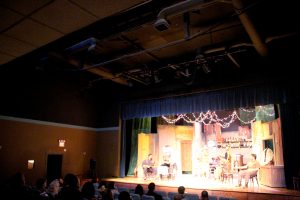
By David Wilfong, NDG Special Contributor
The decision to increase support to the AT&T Performing Arts Center (ATTPAC) from the City of Dallas to the tune of $15 million over the next 10 years drew heavy debate on the city council. Specifically, Councilmember Scott Griggs expressed disappointment when the matter was laid out for the Arts, Culture and Libraries Committee on Sept. 19.
When the full council met for its briefing two days later, Griggs had introduced a budget amendment to allocate funds for the purpose of supporting smaller, non-city-owned arts organizations as well. Griggs’ plan laid out a grant program for $400,000, citing the need for the city to look at the broader scope of arts activity occurring outside the major arts district in downtown.
“It’s not only the big arts organizations that make Dallas great, but it’s many of our small ones, and they’ve got needs also,” Griggs said. “Just like we did for the children’s theater a few years ago, and so I would like to add some funds for small, non-city-owned arts and cultural facilities. A grant program to help them with their needs since they’re a part of our ecosystem here.”
The amendment set aside $400,000 from the maintenance budget for cultural arts. Jennifer Scripps, director of the Dallas Office of Cultural Affairs, cited past precedent being organizations in their own facilities with a value of $1 million or more. According to Scripps, there are four organizations in the city which meet that criteria; TeCo (Bishop Arts Theatre Center), Anita Martinez Ballet Folklorico, The Creative Arts Center of Dallas and Theatre Three.
The move was not without its critics. In addition to it being a late addition to the budget process, there was also a concern for the impact it would have on city facilities.
“Is this a thing that we’re going to forego maybe roof repair, AC, foundation, carpet or anything like that in lieu of programming?” Deputy Mayor Pro Tem Erik Wilson asked.
While the funds were not for programming, city staff advised that it would indeed come from maintenance and that city-owned facilities were currently sitting on an approximately $7 million inventory of maintenance needs.
Wilson spoke firmly against making a move, but it received support from eight council members and passed.
This week, those smaller arts organizations got their first bit of communication from the city in regards to receiving the funds set aside. Teresa Wash is the executive director of TeCo Theatrical Productions, Inc. and said she received an e-mail from Griggs on Monday to get the ball rolling on the process.
“(Griggs) said he is prioritizing a meeting with the cultural affairs commission to finalize the program,” Wash said. “Then he will meet with our board to give us an update fairly soon, so we’re hoping by the end of the year we will have guidelines and know a bit more about how that funding is going to be rolled out.
“For organizations like ours, non-city-owned facilities could use this money to reduce construction debt or a number of other maintenance, if you will, responsibilities as it relates to our facilities.”
Wash said the organizations in question are required to file applications for the grants, outlining how their need fit into the scope of purpose for which the funds were set aside.
“There are four arts organizations that are eligible, but of course we won’t know until the application process who applies for the money,” Wash said. “I would suspect that all four of us will apply, but that’s just an assumption I would be making.”
At the time of the ATTPAC request, there were numerous voices in the Dallas arts community who felt that the money would be better spent across a wider swath of the Dallas arts scene. While many were disappointed in the ultimate decision to go forward with the ATTPAC’s bailout and its $15 million price tag, some smaller organizations will see a benefit after all.
“I really appreciate Dallas looking at funding in a more equitable way,” Wash said. “There are a lot of resources available for city-owned facilities, but this is the first time that funding has been available for those organizations that did not need the help of the city to renovate or build their theaters.




